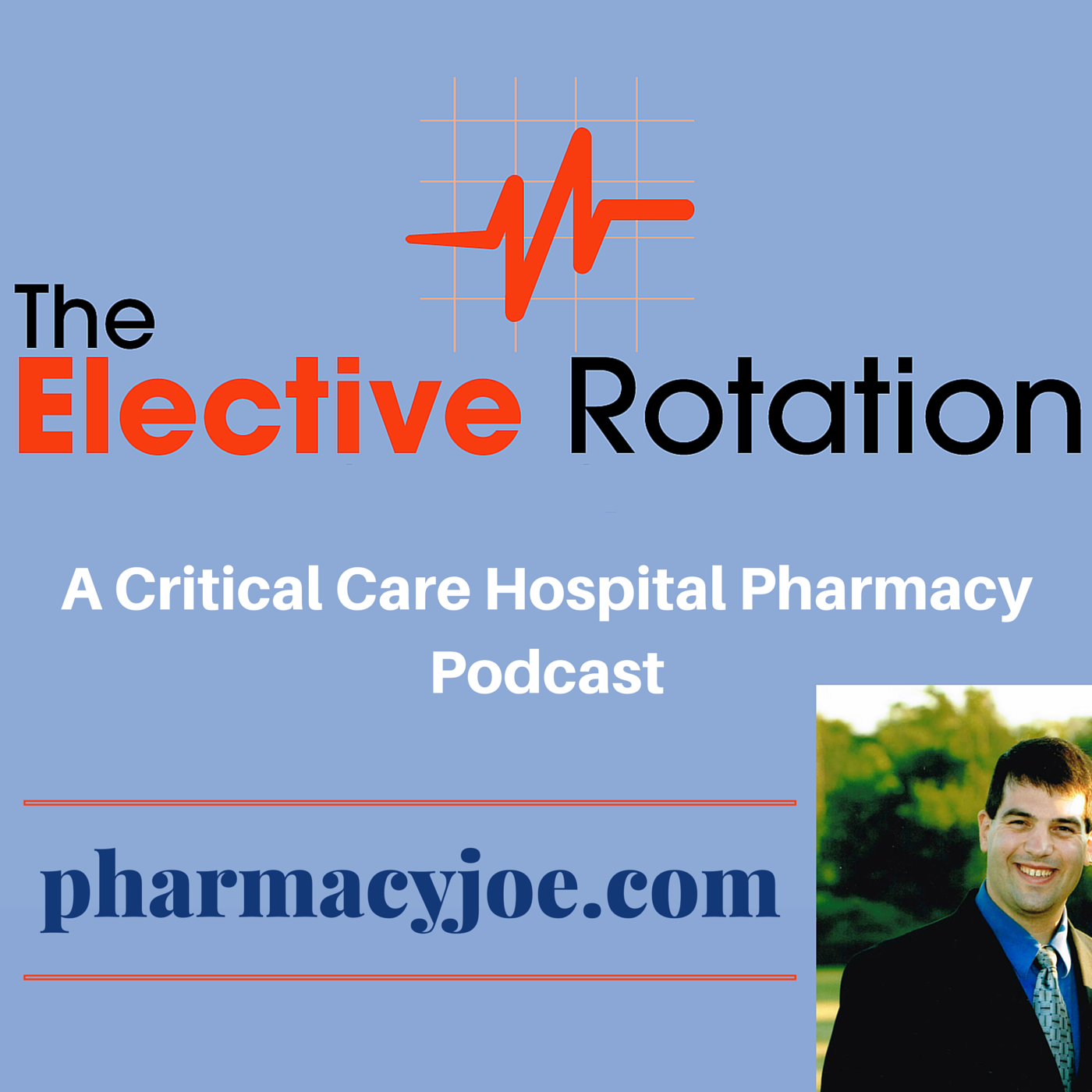In this episode, I’ll discuss the 4 categories of interventions to treat medication overdose and why antidote is not #1. Subscribe on iTunes, Android, or Stitcher I consider the 4 categories of interventions to treat medication overdose to be: #1 Supportive care #2 Antidote therapy #3 Decontamination #4 Enhance elimination As pharmacists, it is easy […]
A free twice-weekly podcast where you can listen to critical care and hospital pharmacy information
Subscribe to the #1 ranked critical care and hospital pharmacy podcast, The Elective Rotation here:
Episode 915: The rare case when a very hypotonic solution may be indicated
In this episode, I’ll discuss the rare case when a very hypotonic solution may be indicated. Subscribe on iTunes, Android, or Stitcher A recent commentary published in AJHP argues for abandoning the use of extremely hypo-osmolar intravenous solutions to treat hypernatremia. The authors consider extremely hypotonic solutions to be 0.225% sodium chloride (also called one-quarter […]
Episode 914: Does Oral Phosphate Replacement Work as Well as IV For Critically Ill Patients With Mild to Moderate Hypophosphatemia?
In this episode, I’ll discuss oral vs IV phosphate replacement for critically ill patients with mild to moderate hypophosphatemia. Subscribe on iTunes, Android, or Stitcher IV phosphate is frequently used to replace low serum phosphate levels in critically ill patients. However this often requires the administration of significant amounts of IV fluid, which can complicate […]
Episode 913: Is there an efficacy tradeoff when reducing apixaban dose in patients with end-stage renal disease?
In this episode, I’ll discuss the efficacy tradeoff when reducing apixaban dose in patients with end-stage renal disease. Subscribe on iTunes, Android, or Stitcher The prescribing information for apixaban recommends not reducing the dose when being used in patients with end-stage renal disease and atrial fibrillation. However, renal elimination accounts for 27% of apixaban clearance. […]
Episode 912: Are Standard Doses of Apixaban as Effective as Warfarin in Patients With Severe Obesity?
In this episode, I’ll discuss whether standard doses of apixaban are as effective as warfarin in severe obesity. Subscribe on iTunes, Android, or Stitcher Initial studies for apixaban such as ARISTOTLE had a median weight of 82 kg and did not focus on determining efficacy in a severely obese patient population. Because of the lack […]
Episode 911: But They Have Altered Mental Status So We Have To Treat
In this episode, I’ll discuss the risk of bacteremia in patients with asymptomatic bacteriuria and altered mental status. Subscribe on iTunes, Android, or Stitcher Perhaps one of the most frustrating scenarios dealing with antimicrobial stewardship is that of a patient with asymptomatic bacteriuria (meaning no systemic signs of infection) but altered mental status. Many clinicians […]
Episode 910: How to judge whether a journal is reputable?
In this episode, I’ll discuss how to judge whether a journal is reputable. Subscribe on iTunes, Android, or Stitcher There are dozens of well-established journals that when we read an article in them, the thought never comes to mind “Is this journal reputable?” But there are also journals with little or even no peer review, […]
Episode 909: Is this a better metric for antibiotic stewardship?
In this episode, I’ll discuss a novel metric for antibiotic stewardship. Subscribe on iTunes, Android, or Stitcher Days of Therapy (DOT) is probably the most common metric to track antimicrobial stewardship efforts related to antibiotic consumption. DOT is not a perfect metric as it is calculated by calendar day regardless of the number of doses […]
Episode 908: Finally, All the VTE Recommendations In One Document!
In this episode, I’ll discuss the consolidated CHEST guidelines on antithrombotic therapy for venous thromboembolism disease. Subscribe on iTunes, Android, or Stitcher The CHEST guidelines on venous thromboembolism disease are an invaluable resource, but one flaw that has persisted since 2016 has made referencing the guidelines awkward and inconvenient. When the 1st updated to the […]
Episode 907: What predicts critical care pharmacist intervention – patient acuity or medication regimen complexity?
In this episode, I’ll discuss what predicts critical care pharmacist intervention – patient acuity or medication regimen complexity? Subscribe on iTunes, Android, or Stitcher It makes intuitive sense that both scenarios of high patient acuity and high medication regimen complexity would be legitimate ways of identifying ICU patients who are more likely to need pharmacist […]
Episode 906: Does Using Ketamine for Induction Have a Lower Mortality Rate Than Etomidate?
In this episode, I’ll discuss the mortality rate for critically ill patients when ketamine vs etomidate is used as an induction agent for intubation. Subscribe on iTunes, Android, or Stitcher Out of the available induction agents for intubation, ketamine is considered to have the best cardiovascular risk profile, as it typically has a neutral to […]
Episode 905: Does It Matter Which Antibiotic You Give First?
In this episode, I’ll discuss which antibiotic should be given first in sepsis – the beta-lactam or the vancomycin? Subscribe on iTunes, Android, or Stitcher Quickly administering appropriate empiric antibiotic therapy is essential in the treatment of severe infections. If multiple antibiotics are required for empiric therapy to treat a severe infection (such as for […]
- « Previous Page
- 1
- …
- 15
- 16
- 17
- 18
- 19
- …
- 93
- Next Page »
